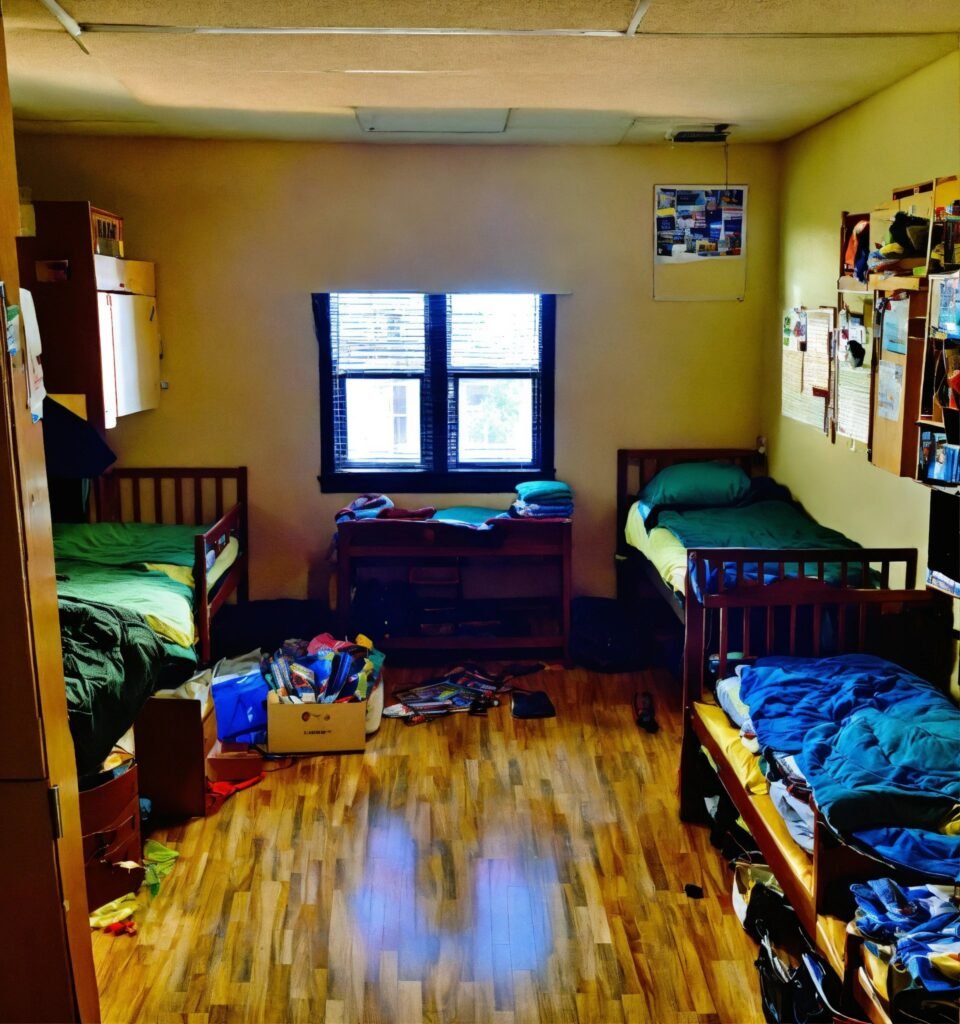Introduction
Choosing where to live during your college years is a big decision. It can shape your social life, study habits, and overall college experience. So, how do you decide between dorms and off-campus living? Let’s break it down and explore the pros and cons of each option.
Understanding Dorm Life
What Are Dorms?
Dormitories, or dorms, are residential buildings provided by colleges and universities. They’re typically located on or very near campus, offering students a convenient place to live while they attend school.
Typical Dorm Room Layouts
Dorm rooms usually come in various configurations, from shared rooms with one or more roommates to single rooms. They often include basic furnishings like a bed, desk, and closet. Bathrooms can be private, shared among a few rooms, or communal for the entire floor.
Social Aspects of Dorm Living
One of the biggest perks of dorm life is the social environment. You’ll be surrounded by other students, making it easy to meet new people and form friendships. Many dorms organize social events and activities to help residents bond.
Academic Support in Dorms
Many dorms offer academic support services, such as study groups, tutoring, and quiet study areas. This can be particularly helpful for freshmen adjusting to college-level coursework.
Safety and Security in Dorms
Dorms often have strict security measures, including locked entrances, security personnel, and resident advisors (RAs) to ensure a safe living environment. This added layer of security can provide peace of mind for both students and parents.

Pros of Living in Dorms
Proximity to Campus
Living in a dorm means you’re just steps away from your classes, libraries, and other campus facilities. This convenience can save you time and make it easier to participate in campus activities.
Community and Networking Opportunities
Dorms offer a built-in community. You’ll have plenty of chances to meet people, make friends, and build a network that can be valuable throughout your college career and beyond.
All-Inclusive Costs
Most dorms charge a flat fee that includes rent, utilities, internet, and sometimes even meals. This can simplify budgeting, as you won’t have to worry about multiple bills each month.
Campus Resources and Activities
Dorm residents often have easy access to campus resources like gyms, dining halls, and study centers. Plus, you’ll be more likely to hear about and attend campus events and activities.
Cons of Living in Dorms
Limited Privacy
Sharing a room or living in close quarters with others can mean less privacy. You’ll have to navigate living with roommates and having less personal space.
Potential for Noise and Distractions
Dorms can be noisy, especially if you live in a building with a lot of social activity. This can make it challenging to find quiet time for studying or relaxing.
Rules and Regulations
Dorms typically have rules and regulations that residents must follow, such as curfews, quiet hours, and restrictions on guests. These can feel restrictive if you’re used to more freedom.
Space Constraints
Dorm rooms are often small and come with limited storage space. You’ll need to be strategic about what you bring and how you organize your belongings.

Understanding Off-Campus Living
Types of Off-Campus Housing
Off-campus housing can range from apartments and houses to shared rooms in a larger home. Each type offers different amenities and levels of privacy.
Finding Off-Campus Housing
Finding the right off-campus housing can take some effort. You’ll need to research neighborhoods, visit potential properties, and possibly find roommates to share costs.
Financial Considerations
Living off-campus often requires a more detailed budget. You’ll need to account for rent, utilities, internet, and other expenses like groceries and transportation.
Lease Agreements and Legalities
When living off-campus, you’ll likely need to sign a lease agreement. It’s important to understand the terms of your lease, including the duration, rent amount, and any rules or responsibilities.
Pros of Off-Campus Living
Greater Privacy
Off-campus housing often offers more privacy than dorms. You’ll have your own room and possibly your own bathroom, providing a quieter, more personal space.
More Space and Comfort
Apartments and houses typically offer more space than dorm rooms, including larger living areas, kitchens, and sometimes even outdoor spaces.
Freedom and Independence
Living off-campus gives you more freedom to set your own rules and schedule. You’ll have greater control over your living environment and lifestyle.
Potential for Cost Savings
Depending on the housing market and your lifestyle, living off-campus can sometimes be more affordable than dorm living, especially if you share expenses with roommates.

Cons of Off-Campus Living
Distance from Campus
One of the main drawbacks of off-campus living is the distance from campus. You’ll need to account for commuting time and transportation costs.
Added Responsibilities
Living off-campus comes with added responsibilities, such as paying bills, managing household chores, and dealing with landlords or maintenance issues.
Potential Isolation
Living off-campus can be isolating, especially if you don’t make an effort to stay connected with campus life and your peers.
Variable Costs
Unlike dorms, which have fixed costs, off-campus living expenses can vary from month to month, making budgeting more challenging.
Making the Decision
Personal Preferences and Priorities
Consider what matters most to you. Do you value privacy and independence, or do you thrive in a social environment? Your personal preferences will play a big role in your decision.
Financial Situation
Evaluate your budget and financial situation. Can you afford the costs of off-campus living, including unexpected expenses? Dorms might be a more predictable financial option.
Academic and Social Needs
Think about your academic and social needs. If you need easy access to academic support and enjoy being part of a community, dorms might be the better choice.
Safety Considerations
Safety is a key factor. Consider the security measures in place in both dorms and potential off-campus housing options.

Conclusion
Choosing between dorms and off-campus living is a personal decision that depends on various factors, including your preferences, financial situation, and lifestyle needs. Both options have their pros and cons, and what works for one person might not be ideal for another. Take the time to weigh your options, visit potential housing, and think about what environment will best support your college experience. Whatever you choose, remember that it’s an important part of your journey and can significantly shape your time in college.
FAQs
Is living off-campus cheaper than dorms?
It can be, depending on the local housing market, how many roommates you have, and your lifestyle. Off-campus living can offer cost savings, but it’s important to budget carefully.
How can I find off-campus housing?
Start by checking your university’s off-campus housing resources, online rental listings, and local real estate agents. Networking with other students can also help you find good options.
Are dorms safer than off-campus housing?
Dorms typically have more structured security measures, like locked entrances and security staff. However, many off-campus housing options also have security features. Research and choose a safe neighborhood.
Can I switch from dorms to off-campus housing mid-year?
It depends on your school’s housing policies and your lease terms. Check with your housing office and read your lease agreement carefully before making any changes.
What should I consider before signing a lease?
Before signing a lease, consider the lease duration, rent amount, security deposit, rules and regulations, and your responsibilities as a tenant. Make sure you understand all terms and conditions.
